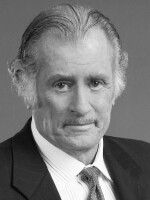We usually wait for milestones to salute excellence -- but every now and then, it's worth just pausing to admire some athlete who is unique, who does something spectacular, but does it day after week after year. So, like that, may we now sing the praises of Ichiro Suzuki, as he completes his 10th season in American baseball.
No, it is not as if Ichiro is ignored, unsung. He's not only been an MVP, but he's made the All-Star team every season, and he holds the major league record with nine straight 200-hit seasons. But then, Ichiro is on a losing team in Seattle, he hasn't appeared in the postseason in nine years -- and he plays out there, up there, in what most of the media consider Baja Yukon.
The fact is, though, that Ichiro is probably better at the task of putting a bat on a pitched ball than anyone -- ever -- in history. Only, at a time when first home runs and then pitching have been fashionable, what he does is like singing Gilbert and Sullivan when everybody is listening to rock.
If he were a basketball player, Ichiro would be shooting set shots. If he were a football player, he would be drop-kicking. Ichiro just brings the bat around, raises his leg and pivots in his peculiar fashion -- and then he makes contact and sends the ball to an empty place.
If he isn't injured, he will easily reach 200 hits again this season. Only Pete Rose did that 10 times, and it took him 17 years. Ichiro will be 10 for 10.
He has 2,200 hits in our major leagues. He made 1,400 hits in the Japanese majors. In case you want to suggest that he feasted on weak pitching over there, well, Ichiro actually averages more hits per game here than he did in Japan. He just hits pitchers. Ichiro makes a little more than 1.3 hits a game -- whoever is pitching, wherever, whatever time of day.
Altogether, at age 36, he has more than 3,600 hits, about 600 fewer than Rose's American record. He'll probably end up with a total of 5,000 safe hits in major league play.
And of course, Ichiro is a significant cultural figure. As the first Japanese position player and the first big star to jump to the U.S., he opened up the American game to Asians, made our national pastime truly worldwide -- even if he can't ever get into a World Series himself.
Our provincial Hall of Fame does not recognize Japanese baseball stars, like Sadaharu Oh, the home run champion. But they can't keep Ichiro out of Cooperstown.
No, maybe he's not the best player of his era -- but, then, he may do better at what he does best than any other athlete of his time. And he made an international difference. So today, simply: Arigato, Ichiro-san.
Copyright 2022 NPR. To see more, visit https://www.npr.org. 9(MDAzMjM2NDYzMDEyMzc1Njk5NjAxNzY3OQ001))







